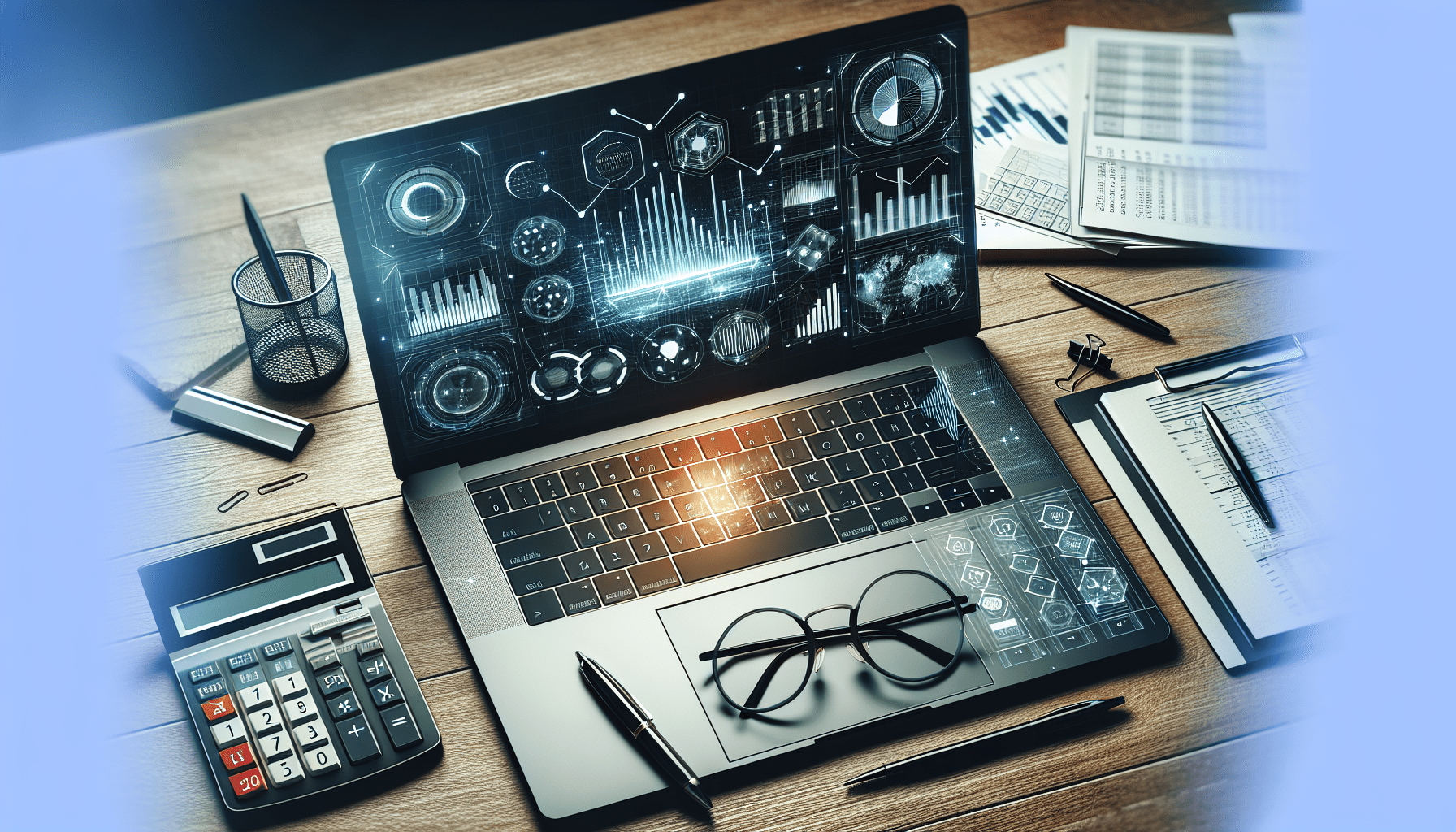Have you ever wondered what makes accounting more efficient and accurate in today’s digital age? The answer lies in the use of accounting software, a tool that has revolutionized the way businesses manage their financial data. Understanding how accounting software works can be crucial not only for accountants but also for business owners and anyone involved in financial management.

What Is Accounting Software?
Accounting software is a computer program that assists bookkeepers and accountants in recording and reporting a firm’s financial transactions. The functionality of accounting software varies from simple programs that are suitable for personal finances to more complex software that can run large-scale businesses with multiple accounts across different departments.
The Evolution of Accounting Software
The history of accounting software can be traced back to the late 1950s when companies began to replace traditional manual accounting methods with computer applications. With technological advancements, accounting software has evolved to support a wide range of functionalities including automation of transactional entries, financial reporting, payroll processing, and tax compliance.
Key Features of Accounting Software
Modern accounting software often includes a wide range of features designed to improve the efficiency and accuracy of financial processes. Some of the key features typically found in accounting software include:
-
General Ledger: This serves as the central repository of accounting data and helps in tracking all financial transactions.
-
Accounts Receivable and Payable: Facilitates the management of incoming and outgoing payments efficiently.
-
Invoicing and Billing: Automates the creation and dispatch of invoices, aiding in timely payment collection.
-
Payroll: Manages employee salaries, deductions, and tax withholdings accurately.
-
Financial Reporting: Generates reports like profit & loss statements, balance sheets, and cash flow statements to provide insights into the company’s financial health.
-
Budgeting and Forecasting: Enables planning by predicting future financial performance based on historical data.
These features collectively enhance the ability to analyze financial performance, drive compliance, and improve strategic decision-making.
How Does Accounting Software Work?
The primary function of accounting software is to streamline financial management by automating the recording of transactions and generation of reports. This process begins when data is inputted into the system and continues through various stages of processing until the final output is generated.
Data Input
In accounting software, data can be entered manually or imported automatically from other systems like point-of-sale (POS) terminals or bank accounts. Many modern accounting systems also support optical character recognition (OCR) to capture data from paper invoices and documents, thus reducing manual entry errors.
Processing Transactions
Once the data is entered, the software will process the transactions using predetermined rules. This includes matching credits and debits, categorizing transactions under appropriate accounts, and making necessary calculations for taxes and depreciation. Automation encodes these processes, which ensures consistency and accuracy while saving time.
Data Storage and Security
Accounting software securely stores financial data, protecting it from unauthorized access. Most systems use encryption, data backups, and security protocols to safeguard sensitive information. The storage approach can vary, from on-premise solutions to cloud-based platforms offering flexibility and easy access from anywhere.
Reporting and Analysis
Accounting software generates a variety of reports to provide insights into the business’s financial condition. It enables analysis through real-time dashboards, offering visual representations of key performance indicators. This functionality aids in strategic planning and regulatory compliance by producing accurate financial reports required for audits and tax filings.
Integration With Other Systems
A significant advantage of modern accounting software is its ability to integrate with other enterprise systems such as customer relationship management (CRM) tools and enterprise resource planning (ERP) systems. This integration allows for seamless data exchange, ensuring that financial data is always up-to-date and providing a holistic view of the business operations.
Types of Accounting Software
Choosing the right accounting software depends on the specific needs of your business. Various types of accounting software cater to different requirements:
Basic Accounting Software
Best suited for small businesses, basic accounting software typically includes fundamental functionalities such as income and expense tracking, invoicing, and basic reporting. These systems are ideal for businesses with simple needs and limited budgets.
Mid-Market Accounting Software
These solutions offer more advanced features including project accounting, advanced reporting, inventory management, and multi-currency support. Mid-market accounting software is suitable for businesses that require more than basic capabilities but are not operating at an enterprise level.
Enterprise Accounting Software
Tailored for large organizations, enterprise accounting software provides comprehensive functionalities such as detailed financial analysis, global consolidation, and complex tax regulations management. These systems often support integration with large-scale ERP solutions, making them robust yet flexible for complex operations.
Industry-Specific Accounting Software
Some businesses require specialized accounting capabilities tailored to their unique industry requirements. Industry-specific accounting software offers customized features, addressing niche needs, and compliance with sector-specific regulations, commonly found in industries like construction, manufacturing, or healthcare.
Benefits of Using Accounting Software
Utilizing accounting software presents numerous advantages that help businesses operate efficiently and accurately:
Streamlined Processes
Automation of repetitive accounting tasks reduces manual intervention, streamlining operations, and allowing for more focus on strategic activities. This efficiency ultimately translates into time and cost savings.
Enhanced Accuracy
Reducing human error is one of the significant benefits of accounting software. Automated data entry, calculations, and report generation improve the accuracy of financial data.
Compliance and Audit Readiness
Accounting software helps in maintaining accurate and up-to-date financial records, which is crucial for compliance with financial regulations. This makes it easier to prepare for audits and tax filings.
Real-Time Financial Monitoring
Real-time access to financial data helps in effective monitoring and management of business finances. It supports informed decision-making by providing timely insights into financial performance.
Scalability
Modern accounting software solutions are scalable, allowing businesses to add new users, features, and integrations as they grow, thus supporting long-term business objectives.
Security
With robust security measures, accounting software protects sensitive financial data from unauthorized access and breaches, ensuring data integrity and confidentiality.

Choosing the Right Accounting Software
Selecting the optimal accounting software involves considering several factors crucial for aligning with your business needs. Here are some vital considerations:
Identify Your Business Needs
Consider the size of your business, industry, and specific accounting needs. Identify essential features that align with your business goals and processes.
Budget
Evaluate your budget for acquiring and maintaining the software. Compare different pricing plans, keeping in mind the total cost of ownership, including possible training and support costs.
User-Friendliness
Choose software that is intuitive and easy to use. A user-friendly system minimizes the learning curve and allows for quick adoption by your team.
Customization and Scalability
Ensure that the software can be customized to fit your unique processes and has the capacity to scale with your business as it grows.
Support and Training
Evaluate the level of customer support and training offered by the software provider. Adequate support ensures that you can solve any issues promptly, minimizing disruptions to your operations.
Vendor Reputation
Research the software vendor’s reputation, considering customer reviews, industry ratings, and stability. A reputable provider often offers reliable and secure solutions.
Compatibility and Integration
Check the software’s compatibility with your existing systems and assess its ease of integration with other applications such as CRM or ERP systems.
The Future of Accounting Software
As technology progresses, accounting software is expected to incorporate advanced features like artificial intelligence (AI), machine learning, and blockchain to further enhance its efficiency and accuracy.
Artificial Intelligence and Machine Learning
AI and machine learning can automate more complex tasks, predict trends, and offer analytical insights into financial data, enhancing decision-making capabilities.
Blockchain
Blockchain technology offers promises of enhanced security by creating immutable records, ensuring the integrity of financial transactions.
Cloud Technology and Remote Access
The adoption of cloud technology is increasing, offering businesses the flexibility to access financial data from anywhere, facilitating remote work environments and global collaborations.
Conclusion
Understanding accounting software and how it works is integral to optimizing your financial management processes. By leveraging the right software, you can enhance accuracy, streamline operations, ensure compliance, and gain valuable insights into your financial health. Whether you are a small business owner or part of a large enterprise, selecting the appropriate accounting software can significantly contribute to achieving your business objectives. With continuous advancements in technology, the future of accounting software looks promising, offering even more capabilities to drive your business forward.
